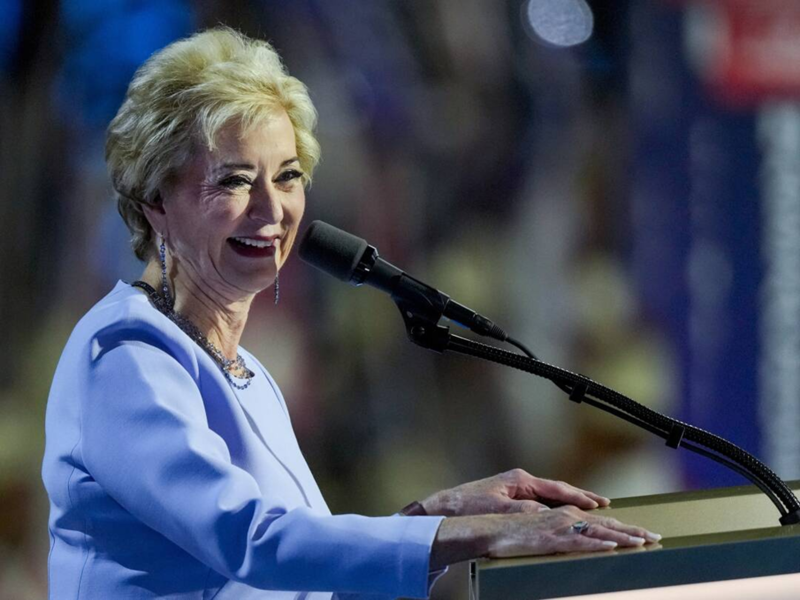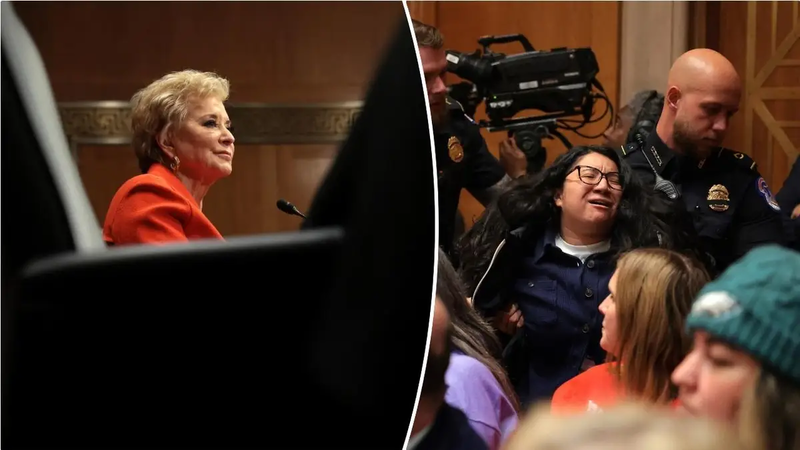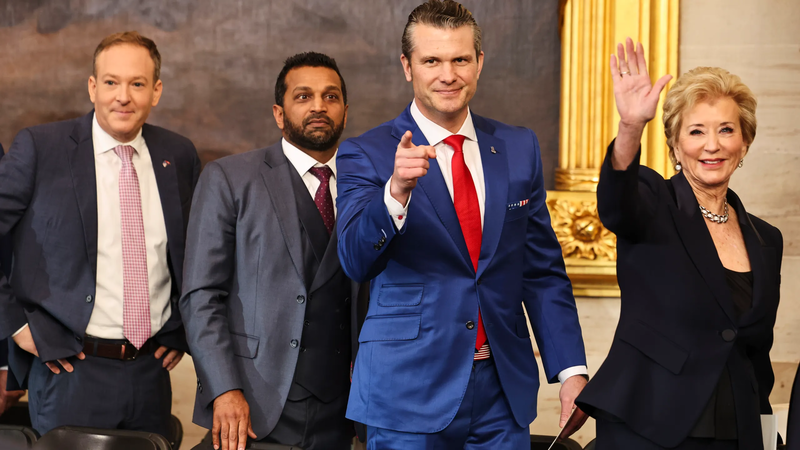Linda McMahon’s ‘Final Mission’ to Decentralize Education
Input
Changed
A New Vision for American Education Opposition from the Left and challenges to McMahon’s Inexperience State Control: A Double-Edged Sword

A New Vision for American Education
Linda McMahon, the newly appointed Secretary of Education under the Trump administration, has wasted no time in laying out her bold vision for the future of American education. On her first day in office, McMahon initiated what she has called the "final mission" of the Department of Education (DoE) — a sweeping plan to eliminate the federal education department and decentralize control of education, returning the power to state and local governments. This move, aimed at reducing the federal government's role in education, is set to fundamentally change the landscape of how public education is governed and funded in the United States.
Linda McMahon’s appointment to the Department of Education has been one of the most controversial in recent political memory. Known for her leadership of the WWE and her previous role as the Administrator of the Small Business Administration, McMahon has little to no experience in the education sector. Despite this, she has been an outspoken advocate for the decentralization of education, emphasizing that state and local governments should have greater control over how schools are run and how education is delivered.
McMahon’s plan is not just to reform the Department of Education but to eliminate it altogether, a goal that aligns with the Trump administration’s ongoing push to shrink the federal government. In a statement on her first day, she outlined her vision of an education system where decisions about curriculum, funding, and policy are made at the state level, rather than being dictated by federal mandates.
By reducing the federal role in education, McMahon argues that states will have more flexibility to cater to their specific needs and priorities, leading to more personalized and effective educational systems. While she has positioned herself as a reformer, this initiative has sparked significant controversy, particularly among those who believe that federal oversight is necessary to ensure equity and access to quality education for all students.

Opposition from the Left and challenges to McMahon’s Inexperience
Unsurprisingly, McMahon’s vision has drawn sharp criticism from left-wing policymakers, educators, and activists. Many Democrats and advocates for public education argue that McMahon’s proposals will dismantle vital protections for students, particularly those from disadvantaged communities. The concern is that without a strong federal presence in education, issues such as racial and economic inequality, special education needs, and Title IX protections could be undermined.
For critics, McMahon’s lack of experience in the education sector is a significant hurdle. Despite her business background and history of managing large organizations, McMahon has no background in education policy or teaching. Critics argue that a person with such limited knowledge of the complexities of the U.S. education system is ill-suited to lead a department that impacts millions of students, educators, and families.
The National Education Association (NEA), the country’s largest teachers' union, has been one of McMahon’s fiercest critics. The union has voiced strong opposition to her nomination, citing concerns about her lack of experience in education and her perceived prioritization of privatization and school choice over traditional public schools. They argue that McMahon's approach to education will further weaken the public education system and exacerbate the challenges facing underfunded schools.
One of the most pressing concerns regarding McMahon’s appointment is her lack of direct experience in the education field. While her business acumen is well-documented, education is an area that requires a deep understanding of pedagogy, student needs, and the complex policy frameworks that support public education. McMahon’s history in the business world, particularly in entertainment and media with the WWE, does not offer the practical knowledge needed to address the intricacies of education policy, funding, and classroom management.
Many educators have expressed concern that McMahon's background in business could lead her to treat education like a commercial enterprise rather than a public service. In particular, her advocacy for school choice, including charter schools and private school vouchers, has raised alarms among those who fear that these policies will divert resources from public schools and lead to greater inequality in educational opportunities.
Moreover, McMahon’s tenure as the head of the Small Business Administration has not been without its critics. Her tenure was marked by accusations that she prioritized big businesses over small enterprises, leading to skepticism about her ability to serve the best interests of public education in a similar manner. Critics fear that McMahon will push policies that prioritize corporate interests and profit-driven models at the expense of students, particularly those in underserved communities.

State Control: A Double-Edged Sword
One of the cornerstones of McMahon’s vision is to return control of education to the states, which she believes will foster greater innovation and responsiveness to local needs. This concept is part of a broader push for federalism — the idea that state and local governments should be the primary decision-makers in many areas, including education. McMahon argues that states are better positioned to understand the unique challenges and opportunities within their borders and can craft solutions that work best for their students.
However, this vision of decentralization has its drawbacks. Critics argue that returning control to the states could lead to a patchwork of educational standards and funding models that vary dramatically across the country. States with less wealth or resources might struggle to provide the same quality of education as wealthier states, exacerbating educational inequality. Furthermore, the lack of a federal mandate on issues like civil rights protections, special education services, and standardized testing could lead to inconsistencies in how students are treated and what they are taught.
Without a strong federal presence, there are concerns that states could also reduce their commitment to public education altogether, choosing to divert funds to other priorities or to privatize schools in ways that reduce access to quality education for low-income students. Additionally, without a central body to enforce equity and fairness, vulnerable populations — such as students with disabilities, English language learners, and students of color — may be left behind.
McMahon’s vision for education has, predictably, sparked a fierce political divide. Republicans, particularly those who have long advocated for smaller government and more local control, have generally supported her approach. They argue that the federal government has overreached in education for decades and that it’s time to allow states to determine their educational needs without interference from Washington. Proponents believe McMahon’s plan will help eliminate bureaucratic inefficiencies and create more responsive educational systems tailored to the needs of individual communities.
On the other hand, Democrats and education advocates argue that McMahon’s plan represents a dangerous shift away from the federal government’s responsibility to ensure equal access to quality education. They point to the role the federal government has played in promoting civil rights in education, such as through the desegregation efforts of the 1960s and the implementation of Title IX protections for gender equality in schools. The concern is that without federal oversight, states may backslide on these hard-won educational rights.
As McMahon settles into her new role, all eyes will be on her next steps. The "final mission" to dismantle the Department of Education will undoubtedly face significant opposition, both from the political left and from within the educational community. Yet, McMahon has shown no signs of backing down. Her aggressive stance on decentralizing education reflects a larger ideological battle over the role of government in public services, particularly education.
Whether McMahon’s plan will succeed in reshaping the American education system remains to be seen. The battle between state and federal control is not just about policy but about the fundamental question of how education should be delivered and who should be responsible for it. In the coming months and years, McMahon’s leadership will undoubtedly be tested as she navigates these contentious waters, all while trying to implement a vision that could radically transform the U.S. education system.





















